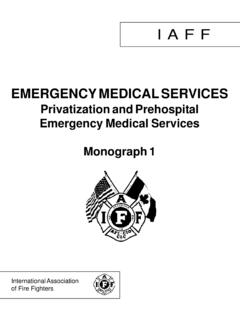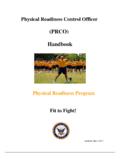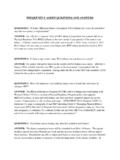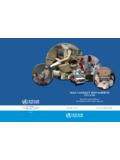Transcription of 8-5-3 Fit for Duty 7-08 - IAFF Main
1 TUALATIN VALLEY FIRE & RESCUE STANDARD OPERATING GUIDELINE NUMBER ORIGINATED AND APPROVED: 07-15-91 LAST REVISED: 07-21-08 SUBJECT: FIT FOR duty PURPOSE: To establish procedures for assessing fitness for duty of District personnel under certain specified circumstances or upon release to return to work following a serious injury or illness. POLICY: If an individual is perceived to be mentally or physically unfit to perform one or more of the essential function(s) of their job, each person their supervisor(s), and the District must follow all appropriate sections of this policy. Additionally, all personnel must follow the guidelines set forth in this policy in order to return to work from personal injury or a serious health condition, whether work-related or not. AUTHORITY AND RESPONSIBILITY: It is the responsibility of each individual, their supervisor, and the District to follow all applicable procedures set forth in this guideline.
2 Each individual is ultimately responsible to be fit for duty . Any supervisor who becomes aware that an individual may be unfit for duty may rely on this policy to ensure that the person in question is removed from their work assignment or prevented from returning to their work assignment until such time that the individual s fit for duty status can be verified under the terms of this policy. The Human Resources (HR), Occupational Health Services (OHS), and Wellness programs will be responsible for managing compliance of District personnel with all the terms of this policy. PROCEDURE: I. Fit for duty A. Self-Report: For the safety and well-being of personnel and their co-workers, an individual is not to report to work if they are seriously ill or impaired, especially in cases of communicable disease (see Attachment 1).
3 An individual with a mental or physical condition that may prevent them from performing an essential job function (refer to individual job descriptions), in an effective and/or safe manner should not report for work until such time as they are cleared by the District, personal physician, or OHS Manager. All personnel should follow District policy regarding sick leave notification as per SOG Sick and Personal Leave for Non-Bargaining Unit Personnel or SOG Sick and Personal Leave for Bargaining Unit Personnel. SOG Last Revised: 07-21-08 Page 11of 11 B. Personal Illness: Personnel are not to report for duty if they are seriously ill or impaired. For specific illness and work restrictions, refer to Attachment 1 Communicable Disease Work Restrictions. C. Medications: Personnel must report the use of any prescribed or over-the-counter medication that may potentially impair their mental or physical abilities to perform the functions of their job safely and effectively.
4 Such notice must be provided to the District Physician, who will work with the individual s prescribing physician to evaluate whether the medication affects the individual s ability to safely perform any essential job function. See Attachment 2 Medication Disclosure Form A and Attachment 3 Medical Release Form B. D. Personnel who report for duty or are on duty while knowingly impaired may face disciplinary charges up to and including termination. For guidelines, bargaining unit personnel should refer to SOG Substance Abuse Policy and Procedures Bargaining Unit Personnel and non-bargaining personnel should refer to SOG Substance Abuse Policy and Procedures Non-Bargaining Unit Personnel. II. On-the-Job and Off-the-Job Illness and Injury: A. All standards and definitions for fit for duty evaluations and assessments are the same regardless of whether the illness or injury is incurred on or off the job (for definitions see Attachment 4).
5 B. For all on-the-job injury/illness or exposures, personnel will follow SOG Reporting and Investigating Injuries and Accidents, filling out all appropriate forms and making all appropriate notifications. C. For off-the-job injury or illness, non-bargaining unit personnel will follow SOG Sick and Personal Leave for Non-Bargaining Unit Personnel and bargaining unit personnel will follow SOG Sick and Personal Leave for Bargaining Unit Personnel. Personnel will make the appropriate notifications as outlined in the pertinent SOG. D. Personnel with an on/off-the-job illness or injury may be subject to a fit for duty evaluation and fitness assessment as set forth below. III. Observation and Reporting A. Any individual observed to be mentally or physically impaired and/or who may be unable to effectively and safely perform one or more essential function(s) of their job may be subject to a fit for duty evaluation by the District physician or other qualified designee, or may be subject to testing in according with SOGs and Substance Abuse Policy.
6 Signs of inability to perform may include apparent weakness, illness, disorientation, memory loss, erratic behavior or inability to SOG Last Revised: 07-21-08 Page 11of 11 successfully complete any individual performance standard (IPS) associated with their position or a fitness assessment . B. Reporting Process: 1. Personnel who observe or who have reason to believe that another individual may be unfit to perform the functions of the job effectively and/or safely, will report such observations to their immediate supervisor. In cases where the individual in question is the immediate supervisor, an on- duty Chief Officer or Division Manager should be notified. 2. The immediate supervisor of the individual in question should contact their Division Manager or on- duty Chief Officer, who will make the necessary arrangements to assess the individual s condition.
7 If the supervisor believes that the condition could affect the safety of the individual or others, the supervisor will immediately take the individual off duty and, if necessary, take the apparatus out of service. 3 The Division Manager/Chief Officer is given the discretion to assess appropriate action to be taken with regard to the individual, which may result in removal of the individual from duty until such time that a fit for duty medical evaluation by the District physician is conducted. A Division Manager/Chief Officer may deem it appropriate to place the individual on administrative leave. 4. In cases where the individual is removed from duty or needs to be referred for a medical evaluation and/or treatment, the immediate supervising officer or administrative supervisor will contact their Division Manager/Chief Officer and Human Resources regarding the situation immediately or as soon as reasonable Initial contact maybe by phone, with written follow-up.
8 C. Referral for Medical Evaluation 1. The District may, determine the need for an individual s fit for duty medical evaluation or fitness assessment required under the following circumstances: a. When actual problems exist or are reported with the individual s performance of any essential function of their job. b. When there exists legitimate concerns about whether the individual or their performance poses a direct threat to the safety and health of themselves or others. c. To determine the necessity for, or existence of, a reasonable accommodation. SOG Last Revised: 07-21-08 Page 11of 11 d. When medical evaluation, screening, and monitoring is required by federal, state, or local law. e. Serious Health Condition, as defined by the Federal Family Medical Leave Act or Oregon Family Leave Act or as outlined in NFPA 1582 2007 version.
9 2 Personnel must follow the guidelines provided in the Family Medical Leave Policy (SOG ) for serious health conditions. 3 Personnel are generally relieved from duty and are placed on HR Administrative Leave and/or sick leave until such time as an evaluation is made. If the evaluation indicates that the individual is not fit for duty , they will continue on sick leave, workers compensation, or disability, until such time as they are released to work in a full or modified capacity. 4 Should the individual require additional treatment or continuing care, the District physician will release the individual into the care of their own healthcare provider. The District will not be financially responsible for illness or injury discovered or identified by a representative of the District, unless the illness or injury has arisen as a direct result of employment with the District.
10 If the individual remains under the care of the District physician, they will be responsible to fulfill the regimen prescribed. 5 Minor Illnesses/Injury: In case of minor illness or injury, the District may require a note from the individual s healthcare provider that releases them to duty or otherwise indicates any recommendation regarding their ability to work. The OHS Program Manager should be contacted for any needed clarification. IV. Return to Work A. Medical Evaluation to Return to Work 1. Any individual returning to work from a serious injury or illness, extended absence, or from any other health-related circumstance that may call to question their ability to perform their duties in a safe and effective manner, must contact the Sr. Benefits Administrator or OHS Program Manager.

















